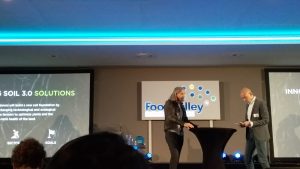EuroAfri Link View About The Protein Puzzle Summit
- 01
- Dec
It is estimated that the human population will reach 9.8 billion by 2050. As a result of this, and with rising standards of living, humans will consume more animal protein which will contribute to further disruption of ecosystems (plants-animals-micro-organisms). So, the question is, how do we create a means of protein production for the future that is sustainable and ecosystem friendly?

Current concerns of planet lovers
The current concern of scientists and environmentalists is that more meat is being consumed relative to consumption of plant-based foods. According to this view, and with the rise in the human population, in the future this will have untold consequences on the environment, animals, landscapes and waterways. As such it is believed that a diet poor in animal protein and rich in vegetable matter is the way forward.
The third international Foodvalley Summit: the protein plan(et) held in Wageningen, the Netherlands on the 17th of October was all about how to address the concern of less animal protein and more plant-based protein. As the moderator Jeroen Willemsen said, it was all about “balancing protein consumption, resolving the protein puzzle, planet earth, mankind, the role of plants and animals”
The summit brought together over 400 business and experts in the food industry that included: food producers, growers, plant breeders, investors, research institutes, start-ups, service providers and the government to help provide solutions to the protein puzzle. As such, the talk of the day was how to solve the protein and nitrogen puzzle in a global context? The summit was organised by Foodvalley, which is at the centre of food and innovation in Wageningen, together with Wageningen UR and Keygene as summit partners, with support from the province of Gelderland where Wageningen is located. Participants at the summit came from all over the world and the whole protein value chain was covered, which included: breeders, processors, raw ingredient suppliers and consumers. There was also a B2B meeting and match-making during the summit.
What the summit meant to EAL
For EuroAfri Link (EAL), a Business Development Advisory Service company that connects African farmers (especially women smallholder farmers) to the EU market, it was a privilege to be at such a summit so as to better understand the current trend of EU Market – requirements and consumer demands. Currently, EU consumers and food producers want to reduce animal protein for health and carbon footprint reasons. So, an increased uptake of plant-based protein (green protein) is an amazing trend because of its multiple impacts (Food system sustainability, climate footprint, health).
EuroAfri Link & EU market information
- From the presentations of the various speakers it was clear which crops are popular in the EU market, with regards to plant-based proteins. They included, amongst others: soybeans, oilseed, rape, sunflower, lupin, pea, field bean like fava beans, alfalfa among others.
- And with regards to Africa, from Prof Giller’s presentation, the following plant-based protein crops are produced: In West Africa – cowpea, groundnut, soyabean; in East & Central Africa – common bean, groundnut, soya bean, cowpea; in Ethiopia – chickpea and faba bean; in Southern Africa – common bean, groundnut, soyabean and cowpea.
- More consumers, especially in the EU, are shifting away from animal to plant-based protein food. So, producing crops that provide plant-based protein will give African farmers an added advantage in the world market., as opposed to focusing on conventional crops like cocoa.
- EU consumers increasingly want to know where their food comes from. Transparency, traceability and food safety in the food supply chain adds more value to the product, with some consumers willing to pay more for such information.
- Soil fertility is an issue when growing crops. As such Nitrogen-fixing bacteria can play an important role in the nitrogen cycle. This will in turn helps, for example legumes, to produce more protein (like in beans), which is vital to humans and animals. Also, these legumes can be a good source of fertiliser for other crops.
EAL learning points
- Replacing animal protein with plant protein will not be the solution to solving the protein puzzle. Rather, the reduction in meat consumption, from every day to every few days, once a week or even becoming vegetarian over periods of a week or several days will go a long way to create a better balance in protein consumption.
- Also solving the protein puzzle is not the task of a single individual, famer, consumer, company or organization, but all stakeholders and beneficiaries work together and each play their own role in finding the solution.
- Taste in plant-based protein product should be primordial, in order to convince consumers to make a conscious decision to eat it. Once taste is perfected, price and authenticity can follow later. Without tasty food, consumers will not consider the other criteria of a quality product.
- Also, eating less meat and more vegetables is beneficial to the ecosystem and helps us live a healthier life.
- Finally, African farmers and cooperatives can together solicit help from research institutes that specialises in the production of plant-based protein crop in order to grow them for both local and the EU market. The idea is to get Africans to organize them into identifiable groups to become leading producers and suppliers of plant-based protein crops to feed the world. Africa has the land and the manpower to their advantage to do so.
The summit has come to an end and EAL has brought back from it valuable, strategic and important EU Market information and data, thanks to the intelligent, eloquent, experienced speakers, who openly shared their rich experiences, research and analytics. At the end of the day it is for consumers to make conscious and independent healthy eating choices, while taking the plants and animals into consideration.
Author: Patience Chindong, co-founder of EAL.
